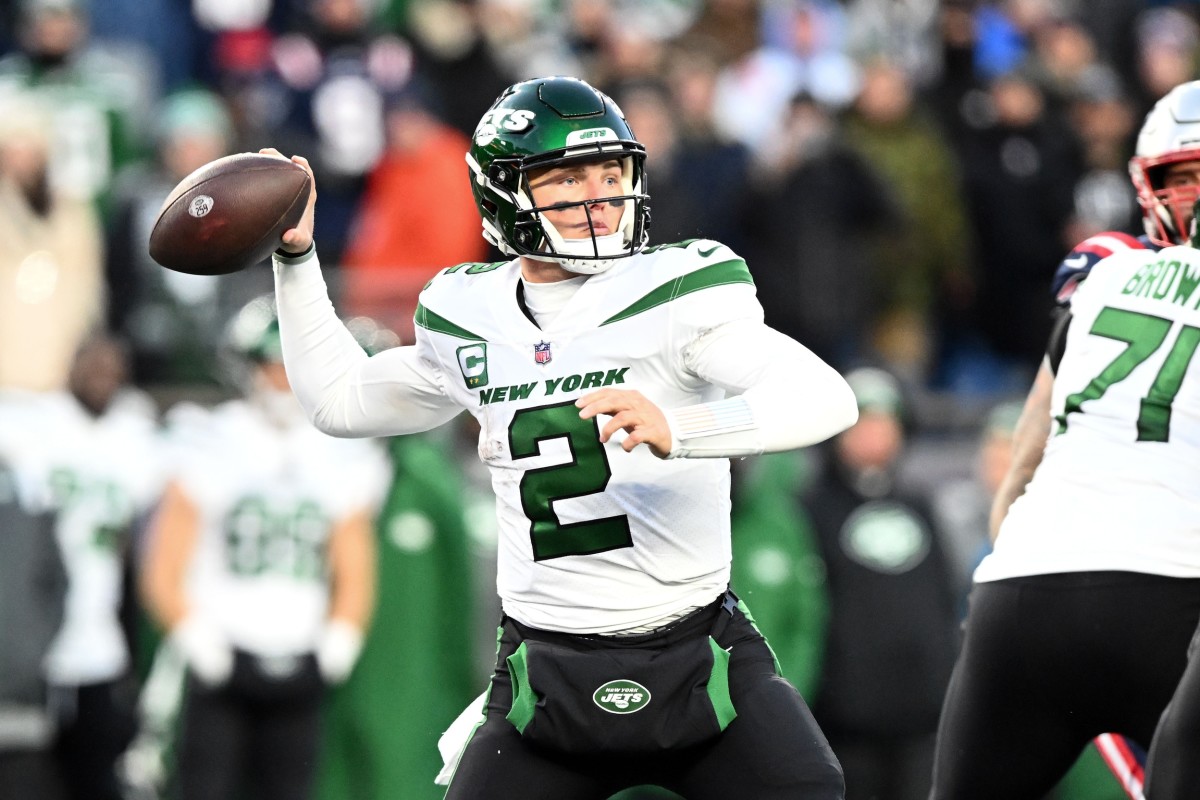Jets Don’t Have to Apologize for Benching Zach Wilson
There are teams, coaches and general managers who should feel some semblance of shame and remorse when they effectively harpoon a young quarterback’s career by benching them or trading them on their rookie contract or giving up on them altogether. These are cases of outright neglect, schematic inflexibility and emotional hard-headedness, the ones we know all too well in the NFL.
But as the Jets prepare for Sunday’s game against the Bears without Zach Wilson in the lineup—a source with knowledge of the situation confirmed an ESPN report that Wilson was benched on Wednesday—their coach should have nothing to apologize for. The Jets did everything they could for Wilson over the course of his first two seasons in Florham Park. Only then did Wilson make it clear that this experiment wasn’t going to work out. As entertaining as it might be to pin this on a terse answer to a postgame question after the 13–3 loss to the Patriots (are we really expecting theatrical-level sorrow or contrition from someone who may just be a private person or someone who is uncomfortable in front of the media?), the Jets had already reached this point with Wilson, even if he did a grand, performative gesture recounting all his life's failures.

We should take a quick opportunity to rein in the rhetoric on Wilson, which has gone from this guy is playing poorly, to this guy was raised by parents with money so he has no ability to lead a football team, which is what ESPN’s Booger McFarland said about the QB prior to Monday Night Football. Wilson, and really, any kid who is barely out of college and experiencing the real world for the first time, needs time to figure himself out. We all need time to figure ourselves out, and the stunning comfort with which some analysts feel they can psychoanalyze a person they know nothing about is disturbing (not to mention the completely asinine assertion that just because someone’s parents earned a comfortable living that their children are unable to take accountability).
We don’t know whether Wilson is a bad person. We don’t know whether he’s not responsible. We don’t know whether he’s a great leader. Wilson may not know those things about himself until he’s in his 50s. I’d be thrilled if I knew that much about myself by the time my own kids are off on their own.
We do know that he’s been logging a substandard output at his position despite the Jets’ best efforts. We are pretty sure they’d have roughly two more wins if someone slightly better was in the lineup. And in that context, it’s perfectly O.K. for Robert Saleh to have moved on.
The Jets surrounded Wilson with legitimate playmaking talent (if Garrett Wilson is on another team, I don’t even think we’re arguing about Offensive Rookie of the Year). They have continually exerted themselves to patch even the smallest hole on their offensive line. They brought in trusted veteran players to bolster the leadership void around Wilson and to help the team grow. Last season, they paid the expenses of Wilson’s personal quarterback coach and brought him on staff to help him better learn the offense.
And, at the schematic level, they are drawing up plays that produce open wide receivers. They are running an offense that has revived the dying careers of several NFL quarterbacks.
When you look at it that way, this is less about whoever Wilson is as a person, and more about the hard facts, the acceptable facts. He has not been good enough. This team is going places with or without him, and the talent level and proficiency within the offense has not matched the growth of the rest of the roster. Saleh’s vision has always been an egalitarian one, and simply shoving Wilson onto the field to protect the reputations of those who drafted him would go against everything he preached to the other 52 players during this massive turnaround.
According to Football Outsiders, Wilson is basically a replacement-level quarterback, slightly worse than other replacement-level quarterbacks (think Cooper Rush, Andy Dalton, Marcus Mariota) who have done a better job adapting to their offense. Replacement-level players get replaced when they perform in a manner that is replaceable.
Because this decision is being made in New York, because the Jets were once a freewheeling organization that, I swear to God, once entertained the idea of starting Mark Sanchez, Tim Tebow and Greg McElroy all at the same time and turned the whole ordeal into a frantic, Real Housewives–type promo (I was in the locker room that day, and it still brings the agita), we are going to make more out of it than we need to. Because this franchise has, in the past, harpooned the careers of young quarterbacks and not taken the responsibility, we’re going to put one occurrence next to another and tie the loose ends together.
But this is not some kind of failure. This is a process we can normalize and accept when a team does all it can for a player and a player doesn’t perform. We don’t know whether Wilson is good or evil, immature or stoic, friendly or standoffish—and it doesn’t really matter. This was a business decision born from good business.
More NFL Coverage:
• This Patriots Defense Is a Belichick Masterpiece
• Pros and Cons of Odell Beckham Jr. Picking the Cowboys or Giants
• Justin Fields Has the Potential to Be a Top-Five Quarterback
• Best NFL Week 11 Performances: MMQB Hands Out Game Balls
• How the Commanders Saved Their Season by Not Panicking
